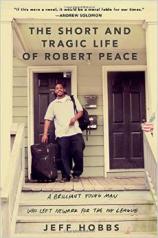Reading Group Guide
Discussion Questions
The Short and Tragic Life of Robert Peace: A Brilliant Young Man Who Left Newark for the Ivy League

1. The title of THE SHORT AND TRAGIC LIFE OF ROBERT PEACE reveals its ending. What was it like to read Peace’s life story, knowing how it would end? Was the tragedy present in your mind throughout the reading experience, or were you able to forget it at any point?
2. When Jackie first asked Skeet for tuition to send their son to private school, Skeet called her “uppity” (pp. 22–23). How does the term “uppity” capture the possibilities and pitfalls of Jackie’s aspirations for Rob?
3. Throughout his short life, Rob “strove to project confidence and strength while refusing to show weakness and insecurity” (p. 57). Why do you think Rob refused to ask for help during his many moments of need? What were the direct and indirect consequences of Rob’s projection of confidence?
4. Discuss Rob’s methods of “Newark-proofing”: code-switching to protect himself in the streets of his hometown. According to Rob, how is Newark-proofing compatible with authenticity? How does Newark-proofing compare to “fronting,” a type of role-play that Rob disdained? Do you agree with Rob’s distinction between Newark-proofing and fronting? Why or why not?
5. Consider Rob’s relationship to the drug trade, as both user and seller. How did marijuana affect his intellect, his emotions and his relationships? Do you think a different legal policy toward marijuana might have affected his life course? Why or why not?
6. Discuss Rob’s attitudes toward money, poverty, and class. In what ways did Rob seek to escape or fix the deprived circumstances of his upbringing? In what ways did he replicate or revert to the cycle of poverty?
7. Consider the complicated journey of Skeet’s conviction, appeals, illness and death. What were the injustices of Skeet’s experience? How do these injustices mirror larger issues of America’s justice system? How might the crime and its punishment be considered ambiguous or complicated?
8. Jeff Hobbs doesn’t enter the story until almost a third of the way through the book, when he and Rob Peace were matched as college roommates. What was it like to begin this book without “meeting” its narrator? How does the narrative change when Jeff steps onto the page?
9. Discuss the universal and particular elements of Rob’s college experience. What are some of the typical college milestones that Rob experienced at Yale? What was extraordinary or singular about his Yale years? In what ways does Rob’s experience point to larger questions about the value of a college degree today, particularly from an Ivy League school?
10. Consider Oswaldo Gutierrez, Rob’s friend who also traveled from Newark to New Haven and back again. Which of Oswaldo and Rob’s obstacles were similar, and which were different? How does Oswaldo’s current success shed light on Rob’s life choices?
11. Revisit Rob’s “statement of purpose” drafted for graduate school applications, printed in full near the end of the book (pp. 337–40). Why do you think Hobbs chose to print the statement in full --- typos and all? What is the effect of reading this rough draft?
12. Jeff Hobbs orchestrates dozens of voices on the life and death of Robert Peace. Of all the perspectives in the book, whose felt most objective? Who, if anyone, might have offered a biased view of Peace’s history?
13. How did you feel when the Burger Boyz were disallowed from attending Rob’s funeral (pp. 392–93)? Could you sympathize with this decision? Do you think these young men deserve forgiveness for any connection with Rob’s death?
14. At Rob’s funeral, in front of four hundred mourners, Raquel compared her friend to a redwood tree, and took “solace in the fact that so many others thrived and found refuge in his shade while he was with us” (p. 390). Why do you think Rob had such a towering influence on so many people? How might that influence extend to the people who “meet” Rob by reading this book?
Enhance Your Book Club
1. Click here to listen to a short interview with Jeff Hobbs on KCRW, the Los Angeles–based radio station.
2. Watch the Academy Award–nominated PBS documentary Street Fight, about Cory Booker’s 2002 campaign for mayor. Learn more about the film and find websites that stream it here.
3. Mourners have left mix CDs on Rob Peace’s grave site. Using your favorite music-streaming service, compile a mix in tribute to Peace, including some of the songs mentioned in the book: “Southern Hospitality” by Ludacris, “Ride wit Me” by Nelly, “Put It on Me” by Ja Rule, “It Wasn’t Me” by Shaggy, “Forget You” by Cee Lo Green, and “Ruff Ryders’ Anthem” by DMX. Add songs by Tupac Shakur, Biggie Smalls, Nas, and even two of the “prog rock” bands Rob discovered through his friend Hrvoje: the Misfits and Black Flag.
4. Try your hand at Jeff Hobbs’s research methods: Choose any friend or loved one as a research subject. Interview three of your subject’s friends or relatives, asking the same two or three questions about the subject’s personal history. Do you get similar versions of the same story, or completely different stories? Discuss your research results with your book club.
The Short and Tragic Life of Robert Peace: A Brilliant Young Man Who Left Newark for the Ivy League
- Publication Date: July 28, 2015
- Genres: Biography, Nonfiction
- Paperback: 432 pages
- Publisher: Scribner
- ISBN-10: 1476731918
- ISBN-13: 9781476731919








